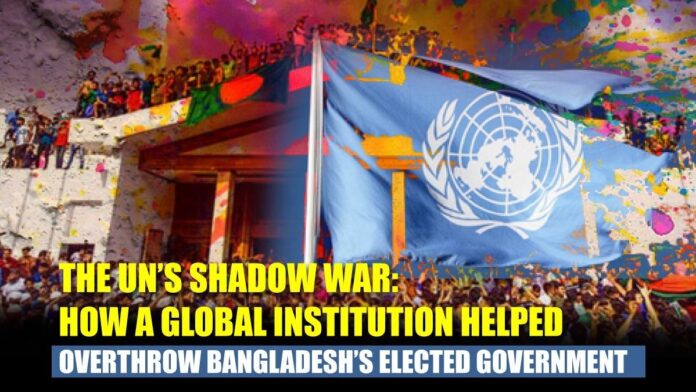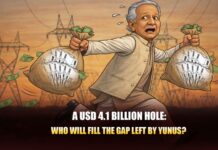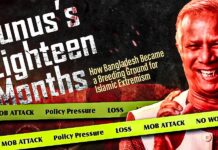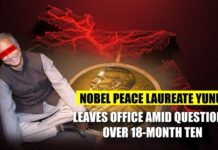The curtain fell on Bangladesh’s July Movement in August 2024 with the resignation of Prime Minister Sheikh Hasina. What began as an anti-quota protest and later adopted the rhetoric of fighting discrimination was, in truth, a well-coordinated campaign aimed squarely at toppling the Awami League and Sheikh Hasina herself. Despite the government conceding to several initial demands, the movement intensified rather than subsided. Government buildings were torched, prisons were stormed, convicted militants escaped en masse, sniper killings targeted demonstrators, and police officers were slaughtered—all culminating in a manufactured state of war. Protest leaders deliberately escalated the conflict to provoke armed confrontation between the military and demonstrators. Faced with the prospect of widespread bloodshed, Sheikh Hasina announced her resignation and was exiled from the country. Whether this resignation adhered to constitutional procedure remains unclear.
On August 5, a military-backed interim government led by Dr. Muhammad Yunus assumed power. Yet rather than restore order, the new regime presided over an explosion of lawlessness. Protesters—led by elements of Jamaat-e-Islami and its student wing, Islami Chhatra Shibir—launched coordinated attacks on over 450 police stations nationwide. More than 2,000 violent criminals and convicted extremists were freed in orchestrated jailbreaks. The vast majority remain fugitives.
Worse still, after August 5, the regime began releasing known terrorists and underworld figures on bail and parole. While claiming these individuals were under surveillance, the reality on the ground told a different story: these criminals established a reign of terror across Dhaka and beyond.
Throughout this orchestrated insurrection, the United Nations’ country office in Bangladesh offered sustained support and legitimacy to the anti-government forces. It is vital to examine the UN’s direct complicity in the destabilization and toppling of a democratically elected government.
The UN’s Silence on Widespread Opposition Violence
From the onset, UN High Commissioner for Human Rights Volker Türk adopted a blatantly partisan position against the government of Bangladesh. In a press release dated July 25, Türk expressed concern about the violence during the protests. Without any credible verification, he cited fabricated death tolls and offered unsolicited policy recommendations to the Bangladeshi government. Türk was deeply preoccupied with “freedom of expression” and the “right to assembly” but conveniently omitted all context that justified the state’s defensive posture.
🔗 Bangladesh: Türk decries government crackdown, urges respect for international human rights standards | United Nations in Bangladesh
Brutal Killings of Police Officers
On July 19, in the Rayarbagh area of Jatrabari, protesters lynched ASI Mohammad Moktadir of the Tourist Police, suspending his lifeless body from an overpass. The police were prevented from retrieving the body for hours due to threats of mob violence. When officers attempted to intervene, they were forced to open fire to disperse the mob, causing several injuries. This savage act went unmentioned in Türk’s press statement, which instead focused on criticizing the government and legitimizing the protesters’ demands.
🔗 In Rayarbagh, under the guise of protest, criminals hang a police officer after killing him – Bangladesh’s Alo
That same day, Inspector Masud Parvez Bhuiyan was hacked to death in Banani. He was ambushed near his residence in Banasree, surrounded by protestors, and attacked after they confirmed his police identity through his wallet and phone. He died two days later in hospital. Once again, Türk remained silent.
Armed Attack on Narsingdi Prison
On the same day, terrorist elements within the protest launched a devastating attack on a high-security prison in Narsingdi. They freed 826 inmates, including nine identified jihadists. Analysts agree that the attack was a targeted operation to liberate these militants. The attackers also looted weapons from the prison armory. This calculated assault, which constituted a grave threat to national security, received zero acknowledgment from Volker Türk.
🔗 What Happened in Narsingdi Prison That Day?
Arson and Destruction of Critical Government Infrastructure
On July 18, 2024, protestors launched a coordinated arson attack on the Bridge Division headquarters in Mohakhali. Six floors of the twelve-story building were engulfed in flames. At least 55 vehicles, along with computers, air conditioners, furniture, and sensitive documents, were destroyed. Nothing was spared—not even the daycare center, Ansar camp, or drivers’ rest areas.
Simultaneously, protestors set fire to the Disaster Management Department in Banani and the central data center. At 7:00 p.m., they torched the headquarters of the Bangladesh Road Transport Authority (BRTA). One group ignited the blaze with octane, another engaged in vandalism, while a third group looted electronic equipment and office furnishings. A similar attack occurred at the BRTA office in Mirpur-14.
🔗 Fires in Disaster Management Department and Bridge Division Office – BBC Bangla
https://www.daily-sun.com/bangla/post/3604
In a separate attack on July 18, demonstrators stormed the Metro Rail Station at Mirpur-10, wreaking havoc and setting the station on fire. Across the country, they attacked police stations, government buildings, toll plazas on elevated expressways, and even passenger trains.
🔗 Fire at Police Box in Mirpur, Metro Stations Closed
Later that evening, the protesters launched an incendiary attack on the national broadcaster, BTV. The six-story BTV building was gutted. Vehicles, archival footage, broadcasting equipment, and official documents were turned to ash. Months later, a madrasa teacher confessed to participating in the attack, stating: “My goal was to take over the BTV control room and declare victory to the nation.”
UN Threatens to Remove Bangladesh Army from Peacekeeping Missions
In the face of escalating violence, Volker Türk reportedly warned the Bangladeshi military not to intervene. In a March interview with the BBC’s HardTalk, he confirmed this pressure. As public anxiety rose, the UN attempted to deny these threats—but it was too late.
Faced with rapidly deteriorating law and order, the government deployed the army. Türk then intervened to dissuade the military from taking any action and succeeded. His own words:
“We did indeed caution the military. If they got involved, it could mean they would no longer be eligible for peacekeeping. As a result, we saw a change.”
The threat of losing lucrative UN peacekeeping assignments—where soldiers earn more in one year than in five years of domestic service—proved decisive. Prioritizing personal earnings over national duty, the military defied its Commander-in-Chief and remained inert during the crisis.
🔗 Volker Türk warns Bangladesh Army: How much pressure did the UN create? – BBC News Bangla
A Selectively Blind Human Rights Report
In February 2025, Türk’s office released a report on alleged human rights violations during the July–August protests. Dr. Yunus himself admitted the report was produced at his request.
🔗 Chief Adviser requests Volker Türk to investigate rights violations | Prothom Alo
The report claims that over 1,400 people were killed between July 1 and August 15. However, it deliberately avoids specifying how many of these deaths occurred after August 5, when the Awami League was no longer in power. According to the July Martyrs Memorial Foundation, more than 820 were killed; the interim government puts the figure at 834.
While no death should be trivialized, attributing murders that occurred post–August 5 to the ousted government is not only dishonest—it is a travesty of justice. The report provides detailed figures only up to August 5 and makes no mention of the nearly 600 killings that occurred in the following two weeks. There are no calls for reform or accountability for the interim regime.
After August 5, vigilante mobs looted homes, burned residents alive, and orchestrated politically motivated arrests. Detainees were held without charge and later accused under fabricated cases. Not a single murder case involving victims of mob violence has been accepted by the judiciary. And yet, the UN’s human rights report fails to mention a single instance of violence targeting the Awami League or its supporters.
Ban on Awami League and UN’s Involvement
On May 12, the interim government led by Dr. Yunus officially banned the activities of the Bangladesh Awami League. This announcement triggered a wave of public outrage and raised serious doubts about the promised “inclusive” elections. Responding to a query, UN Resident Coordinator Gwyn Lewis commented that even without the Awami League, an election could still be considered “inclusive” if voter participation was ensured.
Inclusion is about the people, not political parties, says UN’s Resident Coordinator Gwyn Lewis.
This statement is a damning admission: UN officials in Bangladesh lent legitimacy to the political exclusion of the country’s largest party. Awami League and its 14-party alliance represent nearly 50% of the electorate. How can any election be deemed inclusive while half the electorate is disenfranchised?
The answer becomes clearer when the Election Commission simultaneously moves to ban media from polling centers. In such an environment, the entire 50% could be replaced by fraudulent ballots—with UN endorsement.
Why Did Dr. Yunus Thank the United Nations?
At a UN event on July 29, Dr. Yunus publicly thanked the UN for its “support” during the July movement. He stated:
“During last year’s dark days of July and August, the UN stood with Bangladesh—we are deeply grateful for that solidarity.”
🔗 Speech of Dr Yunus – Facebook
This was not merely an expression of gratitude—it was a confession. It was an acknowledgment that without the UN’s interference, the movement to overthrow Sheikh Hasina would have failed. Dr. Yunus would not be in power, nor would he be serving Western interests or expanding his business empire under their patronage.
Although Gwyn Lewis repeatedly insists the UN has no political role in Bangladesh, its actions—and inactions—speak volumes. Since the fall of the Awami League, the UN has consistently legitimized the repression of its members under the guise of human rights.
The July movement was a domestic political upheaval. For the UN to commemorate its anniversary with an official event, while failing to mention any of the human rights abuses that occurred over the past year, is both unethical and unprecedented. The event served not as a forum for justice but as a platform to vilify the Awami League and Sheikh Hasina.
Former Prime Minister Sheikh Hasina long warned of a Western-backed conspiracy to unseat her. Since August 5, developments surrounding St. Martin’s Island and the Rakhine Corridor have confirmed these fears. Many who once supported the movement have grown disillusioned.
Should elections include the Awami League, Jamaat-e-Islami and the unregistered National Citizens’ Party (NCP) face electoral annihilation—and the potential forfeiture of their candidates’ deposits. To prevent this, Dr. Yunus sees only one path forward: to hold elections without the Awami League. And the central architect of that strategy is the United Nations.





